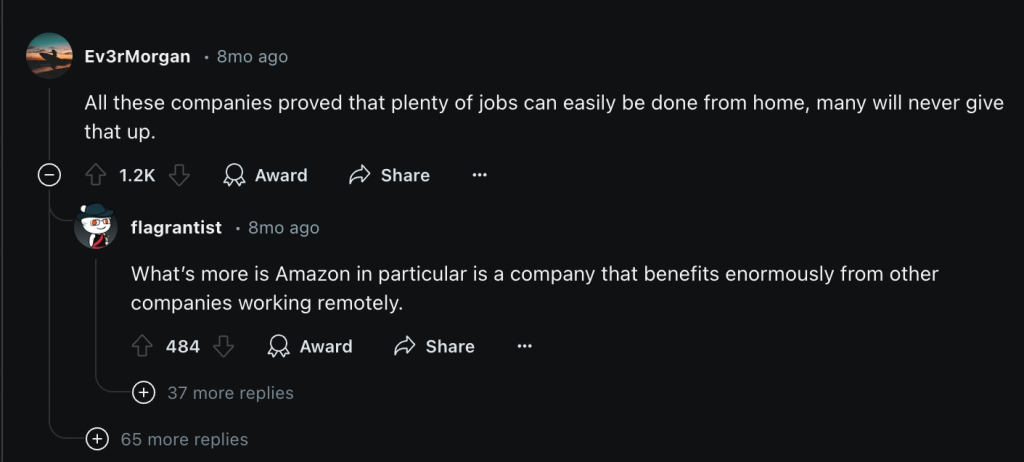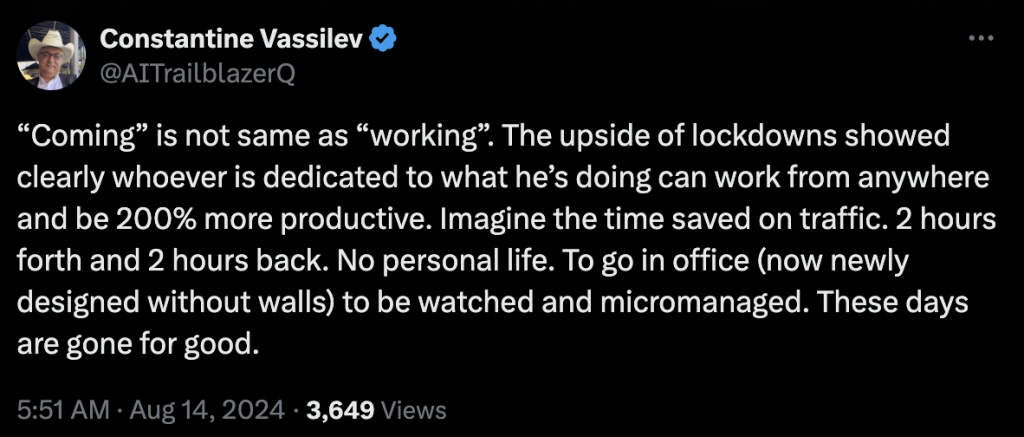“It’s not just a productivity thing, I think it’s morally wrong,” Elon Musk noted.
When the COVID-19 pandemic hit the world, working from home became a norm. While it was the only choice at first, many of us now have adopted this working model perhaps longer than needed. Recently, former Google CEO Eric Schmidt reflected on this shift and said, “Google decided that work-life, going home early, and working from home, is more important than winning.”
Schmidt highlighted the reality and remarked that startups like OpenAI are taking over Google because employees at these big companies come to the office just one day per week.
Ironically, back in April in 2021, current Google CEO Sundar Pichai suggested that the ideal way to achieve work-life balance is to offer employees two days of work from home. But, it seems like the comfort zone is not for innovators.
Several scientists from Google DeepMind have left the company to establish new AI startups. One such venture is Paris-based startup H, which develops foundational AI models. Mistral AI, another AI company founded in 2023 by former Google DeepMind and Meta researchers, focuses on building open-source and commercial AI models.
Unacherated Labs, a generative AI startup, was launched by three Google DeepMind researchers – David Ding, Charlie Nash, and Yaroslav Ganin. Additionally, Tokyo-based Sakana AI was founded by David Ha and Llion Jones, two former Google researchers. And the list goes on.
Is Work from Home a Moral Issue?
Earlier in 2023, Elon Musk, Tesla CEO, made headlines for opposing remote work culture. “I think that the whole notion of work from home is a bit like the fake Marie Antoinette quote, ‘Let them eat cake’,” Musk told CNBC.

“It’s not just a productivity thing, I think it’s morally wrong.” Musk noted that if one plans to work from home, but expects others—like those who manufacture cars, prepare and deliver food, or fix the house—to go to work everyday, then it is not morally right.
Speaking of the productivity end, OpenAI CEO Sam Altman in the previous year, noted that employees working from home create confusion while working from the office creates new products.
At a session organised by fintech company, Stripe, he stated, “I think definitely one of the tech industry’s worst mistakes in a long time was that everybody (thought they) could go full remote forever, and startups didn’t need to be together.”
He further added that the experiment on that is over, and the technology is not yet good enough that people can be fully remote forever, particularly on startups.
In Office ≠ Working
But does coming to the office really prove an employee’s productivity? Last year, Amazon insisted its employees return to work 3 days a week. The company CEO Andy Jassy sent a warning message saying that people who don’t want to go back to the office – “It’s not going to to work out for you.”
Following this announcement, a group of employees walked out in protest at the company’s Seattle headquarters.

If you happen to stay in traffic front cities like Bengaluru, then the scene is four hours travelling for nine hours of work. So, being productive after long hours of travel is a question of concern.

Tech Companies Introduce New Tricks
No matter what an employee thinks or wants, the remote work era has come to an end as tech companies are implementing tricks to lure employees back to the office. Wirpo, starting in May 2023 allowed employees to pick any three days a week to work from the office, offering
campus activities to make the shift more appealing.
Wirpo, starting in May 2023 allowed employees to pick any three days a week to work from the office, offering campus activities to make the shift more appealing.
HCLTech too embraced thrice weekly office routine. However, TCS mandated five-day office attendance and linked variable pay to in-person presence. Sonata Software rolled out its return to office gradually, while Infosys required select employees to work ten days a month in the office.
Sonata Software rolled out its return to office gradually, while Infosys required select employees to work ten days a month in the office. Well, can’t forget Infosys founder Narayana Murthy’s suggestion that Indian youths should work 70 hours a week. But he didn’t mention that employees should work from the office only! Maybe that’s a plus?






































